Why I'm Here
Author: Emily Henkel
“I will get through this. I can do hard things. These hard things will make me better and stronger. Please let me fulfill the rest of my life on this Earth. Please let me use this for good. Please send me a blessing — any blessing — and I pray so hard that soon my rescue will come.”
— Personal journal entry, April 7, 2021, from a cliffside in Death Valley National Park
Life has exposed itself to me in its purest and most naked form — revealing its deepest sorrows and most painstaking moments, providing the rarest view of what is most important. It’s a type of beauty that I’ve seen because I’ve loved with my entire heart and soul and lost it. If you’re reading this, there’s a good chance you are a part of this “club,” too.
Some days, I call it a gift. So many other days, I curse it. How can it not feel like a weight to have experienced the fragility and absolute beauty of life while so many others negate and deny it — to ever-so-frustratingly try to explain to someone, who is not part of this club, that room-temperature wine or someone driving too slow on the freeway is, in fact, not the worst thing that could happen to you today?
You know better. You too have both the gift and the curse of loving with your whole heart and losing it. Not everyone feels the deep sense of gratitude and sorrow that you do — the liveliness and numbness, the growth and the grief, the hope and despair, the admiration and the hatred.
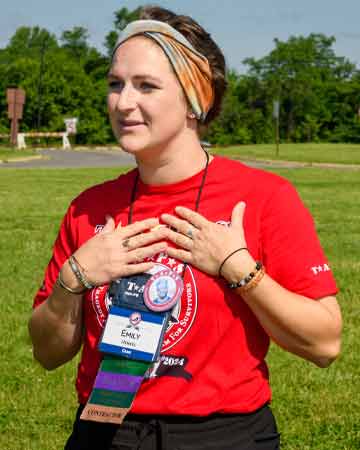
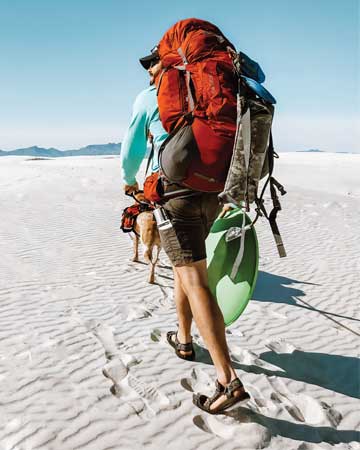
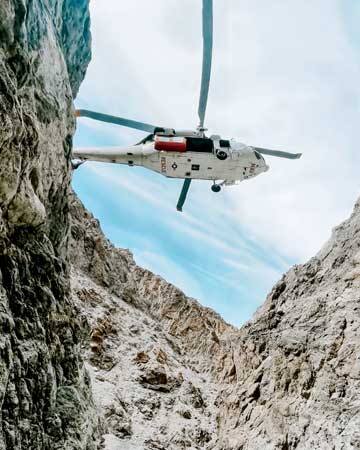
April 2021
On April 3, 2021, I dreamt of a wholesome life with my soon-to-be husband and our future children. After a lifetime of settling for comfort, familiarity, and submission, I had the life that I worked so diligently and patiently to build.
The very next day, all of that was wiped away in the blink of an eye when I lost my best friend and fiancé, Alexander Lofgren, in a hiking accident. He passed quickly, while I spent the next six days as a missing person fighting — through grief — for my own life. When a Navy search and rescue team found me, I had a severely broken leg from falling, but the will to fight harder than I had ever fought before.
Just like the fragility of life, desert sandstone can break down in an instant with a gust of wind or sudden rainfall. In the same way, my life, my goals, and my future with Alex were reduced to millions of sandstone dust particles in a single breath. The day I lost Alex and chose to start fighting for my own life was the first day I understood that, though I am just one person in a world of billions, I can use my voice and strength to help anyone willing to listen.
This is why I am still here.
Searching for Life's Meaning
After surviving something I absolutely should not have, I spent the better part of 2021 searching for life’s meaning. Accepting a life without your better half is one thing, but coming to terms with almost losing my own life was another burden to bear. I’ve spent every day of my healing — three years, plus a lifetime ahead — reminding myself that I chose a fight bigger than I could ever fight alone. But, our loved ones who no longer physically stand by our sides are — in fact — there, watching us every step of the way. They root us on. They are ready for us to move mountains on their behalf, in their honor, and — even more so — for ourselves.
When life was at its lowest, I decided to fight and at least make Alex’s life worth living since he couldn’t do it himself. At the time, I didn’t know what this would entail, but I knew his memory would remain as vibrant and passionate as his personality. Even more so, I had no idea how this would impact my life and the memory I would allow to live on. Some days, all I can do is sit solemnly with no fight left in me to muster, but I pick myself up the next day redetermined to be a beacon for those who so desperately need light.
Alex
Alex was a combat engineer in the U.S. Army, honorably discharged in 2012 after four years of service. When I met him as a veteran five years post-separation, he still struggled each day with the burdens of combat. Alex was determined to make something out of his service in Afghanistan, so he dedicated his life to helping fellow veterans. Between policy advising with a U.S. senator and working alongside a U.S. representative, he was making a difference in ways that mattered.
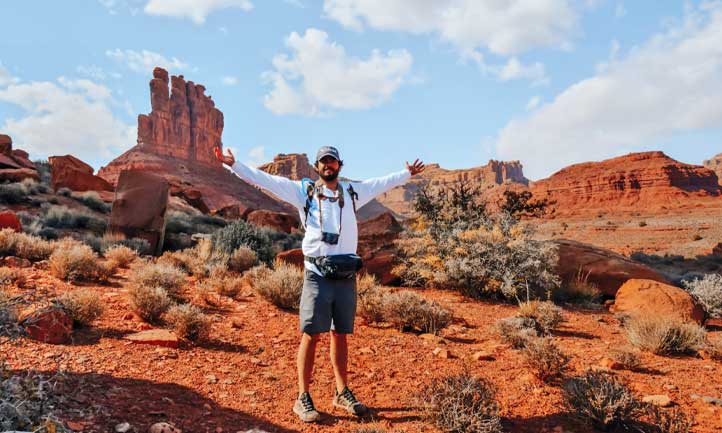
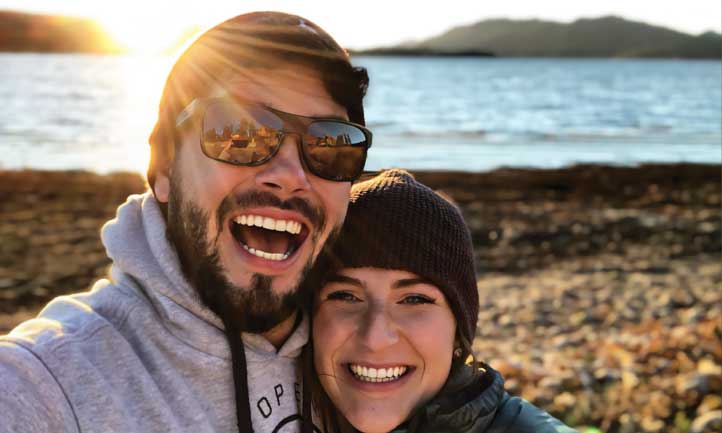
Alex and I shared a love for solitude in nature. Living in Arizona, we had ample opportunity to spend our weekends exploring the American Southwest, and that’s precisely what we did, as often as we could.
Nature healed Alex and allowed him to feel at peace. It healed me in ways I never knew I needed. There was a sense of camaraderie in setting up camp together as a couple, and a solitude in gazing up at the tall ponderosa pines swaying back and forth from the passing breeze. He hadn’t experienced peace like that since long before the war.
Since the moment Alex passed, I searched for meaning in my own life. Why did I survive? Why couldn’t he? It felt nearly impossible to replicate the passion he embodied, but everyone who knew and loved him was determined to fill the void he left in our lives.
Alexander Lofgren Veterans in Parks Act
In December 2021, within the year of his passing, miracles happened on Capitol Hill. A bill was unanimously signed into law that honored the man who fought for veterans’ rights and experienced the healing benefits of nature, the place we spent so much of our time together.
The Alexander Lofgren Veterans in Parks Act was signed into law, granting free access to U.S. national parks and lands for life, beginning November 11, 2023 — Veterans Day, a most appropriate tribute to Alex.
Two years after the law passed, I purchased a camper van and traveled the Southwest United States for nearly a year by myself and two of our dogs, both in Alex’s honor and for my own healing. I was fulfilling a vow to live a gratifying life after life as I knew it was ripped out from under me. I visited national parks new and old — ones Alex and I experienced together, and ones we dreamt of visiting one day. I collected a passport stamp for every park I visited, keeping our tradition — and his memory — alive. While I experienced a deep void being in these beautiful places without him, I found endless comfort in knowing his spirit inhabited every natural space I explored. I was never alone.
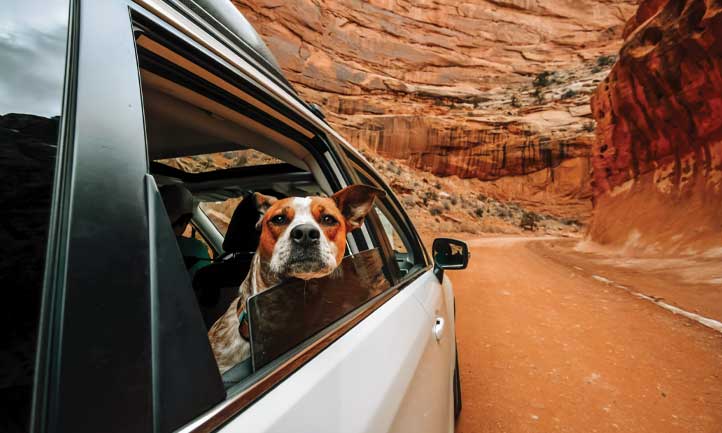
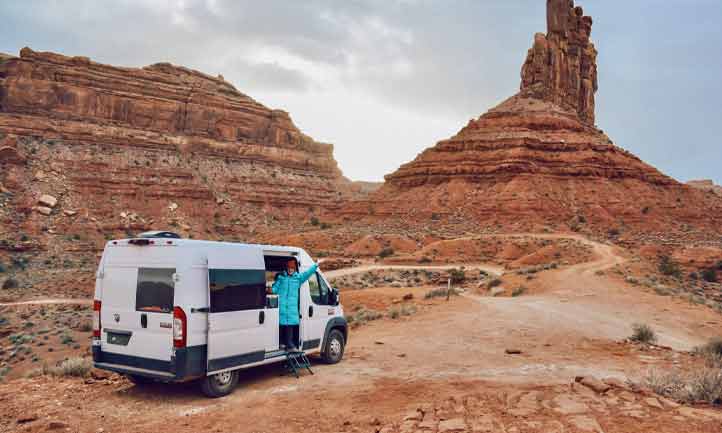
It wasn’t until the end of my life-changing van adventure that I found a part-time role with TAPS, further fueling my desire to live a purpose-driven life following my harrowing experience and Alex’s premature earthly departure. But, as I would learn five months later, my future was only beginning to come into focus.
May 2024
I stood among thousands of people just like me at my first TAPS National Military Survivor Seminar in Washington, D.C., in May, carrying my story of pain, sorrow, perspective, passion, the Alexander Lofgren Veterans in Parks Act, and traveling the country in a van. For the first time, I felt weightless in the arms of survivors who understood me without a single word — just souls connected in one moment. Everyone who has loved and lost carries their own unique and heartbreaking story that — though incredibly painful — is the foundation of their own purposeful life.
Sunday at the seminar was a sunny and incredibly humid day to take a hike, but I felt seemingly unstoppable against the discomfort I have grown to know so well. Plus, being surrounded by other nature-loving survivors felt like home no matter the external forces at play. I stood atop Gravelly Point along the Potomac River with two surprise guests: the National Park Trust and rangers with the National Park Service. Little did anyone know, all 70 hike participants, including myself, were about to receive their very own America the Beautiful National Parks Pass, a precise 882 days after the Alexander Lofgren Veterans in Parks Act was officially signed into law.
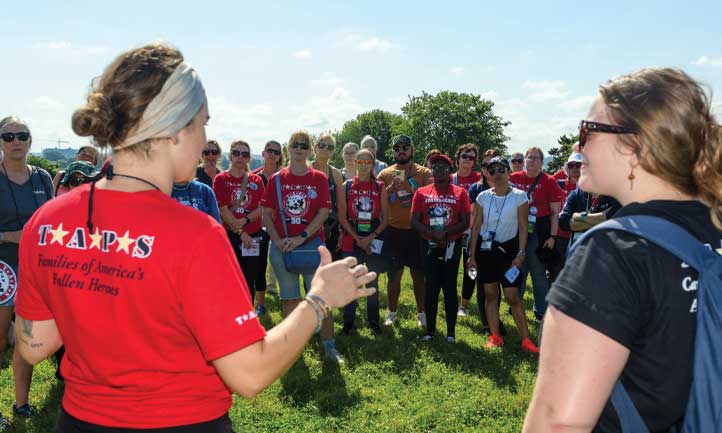
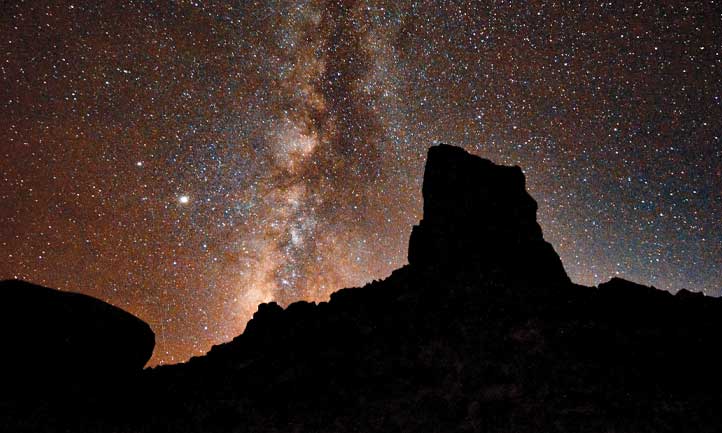
That moment awakened the same feeling I’d had a thousand times staring at the Milky Way and endless universe above me, or experiencing the thousand-foot-tall red sandstone bluffs of southern Utah for the first time. It was like the absolute freedom of driving my van into the westward sunset with my two dogs, Jane and Nora, to be with Alex in our National Parks. It was like the time TAPS fell into my lap five months prior, except this time — in a full-circle moment — I shared Alex’s story of love and light, life and healing in U.S. national parks, something I now get to share with so many others who may need that light more than anything.
I couldn’t prepare myself for this life, especially for the moment, three years ago, when it all crumbled before my eyes. Instead of giving up, I made a pact with myself and Alex to live this life as fully and unapologetically as possible. I am proud of myself for carrying the weight of my grief and trauma, loneliness and isolation, fear and uncertainty, and using it for good when I can muster the strength — because anyone in the club will tell you that strength isn’t always there.
When I need a humble reminder of why I’m alive, I look up at that trusty night sky to feel all at once small, but mighty. I find solace in the stars that shine brightest, little twinkling reminders that Alex and the rest of our loved ones are there, and always will be.
Sometimes in the stillness of a desert night, I swear I hear the whisper of encouragement from the planets, galaxies, and stars: “You can do hard things. You can do impossible things. We are all in this together and are connected more than we ever thought possible…Just keep going.”
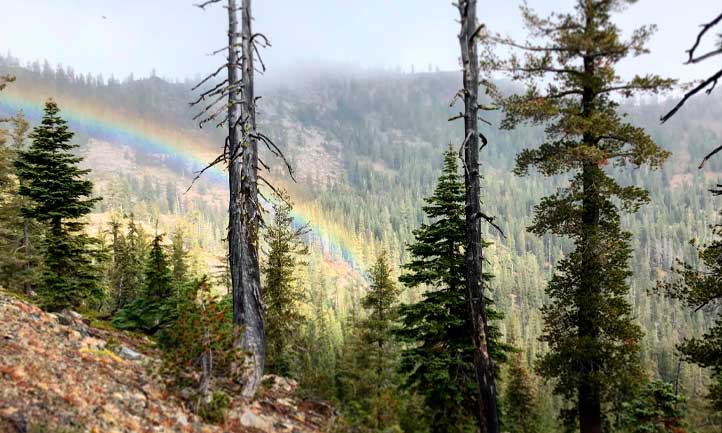
TAPS Outdoors
Thanks to a longstanding partnership with the National Park Trust, TAPS creates unique, healing experiences for survivors of military and veteran loss in some of our country’s most beautiful parks and recreation areas. Check our outdoor event listings often to view upcoming opportunities, and visit the National Park Service website to learn more about the lifetime America the Beautiful National Parks Pass.
Emily Henkel is the surviving fiancée of SPC Alexander B. Lofgren, U.S. Army Veteran
Photos: Emily Henkel
